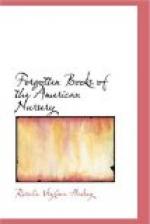Among the stories by Miss Edgeworth are three rarely mentioned by critics, and yet among the most natural and entertaining of her short tales. They were also printed by Jacob Johnson in Philadelphia, in eighteen hundred and five, under the simple title, “Three Stories for Children.” “Little Dog Trusty” is a dog any small child would like to read about; “The Orangeman” was a character familiar to English children; and “The Cherry Orchard” is a tale of a day’s pleasure whose spirit American children could readily seize. In each Miss Edgeworth had a story to tell, and she told it well, even though “she walked,” as has been often said, “as mentor beside her characters.”
Of Miss Edgeworth’s many tales, “Waste Not, Want Not” was long considered a model. In it what Mr. Edgeworth styled the “shafts of ridicule” were aimed at the rich nephew of Mr. Gresham. Mr. Gresham (whose prototype we strongly suspect was Mr. Edgeworth himself) “lived neither in idleness nor extravagance,” and was desirous of adopting an heir to his considerable property. Therefore, he invited two nephews to visit him, with the object of choosing the more suitable for his purpose; apparently he had only to signify his wish and no parental objection to his plan would be interposed. The boys arrive: Hal, whose mama spends her days at Bath over cards with Lady Diana Sweepstake, is an ill-bred child, neither deferential to his uncle, nor with appetite for buns when queen-cakes may be had. His cousin Ben, on the contrary, has been taught those virtuous habits that make for a respectful attitude toward rich uncles and assure a dissertation upon the beneficial effect of buns versus queen-cakes. The boys, having had their characters thus definitely shown, proceed to live up to them in every particular. From start to finish it is the virtuous Ben—his generosity, thrift, and foresight are never allowed to lapse for an instant—who triumphs in every episode. He saves his string, “good whipcord,” when requested by Mr. Gresham to untie a parcel, and it thereafter serves to spin a fine new top, to help Hal out of a difficulty with his toy, and in the final incident of the story, an archery contest, our provident hero, finding his bowstring “cracked,” calmly draws from his pocket the still excellent piece of cord, and affixing it to his bow, wins the match. Hal betrays his great lack of self-control by exclaiming, “The everlasting




